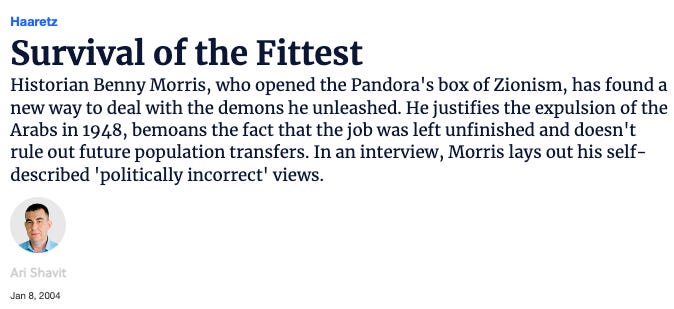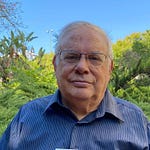Last Sunday, on Feb 25th, we posted a column about those in Israel who are urging that Israel “help” Gazans leave Gaza. Depending on what they mean by “help,” that suggestion could range from kind to very not PC. We wrote then, “Some readers will find this shocking. We’ll soon review a well-known conversation that the Israeli press had many, many years ago with one of Israel’s leading historians, Benny Morris, on the question of what was the agenda in 1948, whether ‘transfer’ was the goal and what he thought of that. His responses will likely surprise you.”
Today, we’re following up on that. As he is one of Israel’s leading historians, Benny Morris’ work on 1948 (in books such as Righteous Victims: A History of the Zionist-Arab Conflict, 1881-2001 and 1948: A History of the First Arab-Israeli War) has been widely quoted and discussed. Almost as well known in some circles is an interview with Ari Shavit, then a young journalist, from about twenty years ago, almost to the day.
What Professor Morris says about 1948 is illuminating for today, as well.
As we’ve noted several times, some people in Israel have suggested that this war, which still does not have a name, be called The Second War of Independence. Because the victory will likely not be decisive, just as was the case iin 1948. Because it’s existential, and long, just as in 1948. And because much of the country will have to be built (or in this case, rebuilt), just as in 1948.
There’s yet another similarity—the issue of what to do with large numbers of Palestinians. The video above, in which veterans of 1948 speak to today’s soldiers, doesn’t have the expressly in mind, but for many Israelis, one can’t raise the issue of 1948 and war without also wondering about the parallels with the Palestinians. Hence the long interview with Ari Shavit and Professor Benny Morris, of which we present a small portion below.
Before we get to that, a few preliminaries:
We begin, below, with a video posted on Instagram of a soldier leaving the hospital. More on that in a minute.
Then there’s the video at the top of this page, more on that, too.
Then our schedule for the rest of the week, and then
The Ari Shavit interview with Benny Morris.
New rituals have developed during this war.
One, heartbreaking, is that of accompanying families from their homes to the cemetery where their sons are about to be buried. Particularly at the beginning of the war, funerals were so packed that it was impossible for everyone who wanted to support the family to get in.
So Israeli social media began announcing when a given family would be leaving their home to head to the cemetery, to which the army would be bringing their son’s body and where the funeral would take place.
People were given the family’s address, and dozens, sometimes hundreds, of people would line the streets of their neighborhoods with Israeli flags. In their cars on the way to the cemetery, families were surrounded by neighbors, friends, and people they did not know, all with flags, so they did not leave their home alone. Those were impossibly painful moments, but also moving beyond words.
Very different is the ritual seen above, in an Instagram posting.
We noted last week that countless soldiers have suffered grievous wounds. They recover in the hospital, and then transfer for rehabilitation centers (such as the place where we saw the marriage proposal last week). Here, too, as the soldier leaves the hospital, the halls are lined with people, many of them with flags. In this video, you can see the medical staff, lots of soldiers (Israelis hospitals are swarming with soldiers these days, for all sorts of reasons), and a few others. The black caption at the top of the screen says “The end of the period at Rambam [Hospital in Haifa], and from there, to rehab.”
The well known song that was appended to the video is “How I love to come home” by Omri Glickman. What you hear is the refrain, so we’ve translated it and added the words below.
But most of all I love coming home After I was gone all night To find the peace I live in take my life away from me How I love to come home To the heart of the woman I live with Bring my sanity back to me already All the usual moments How I love to come home
I don’t know who created the video at the very top of this post, but I thought it was moving. It’s a series of snippets from interviews with veterans, men and women, of the War of Independence, with messages for this generation of soldiers. There’s a lot of verbiage on the screen—both what they’re saying, but also their backgrounds—so you might have to watch it more than once to get everything.
But since we’re moving in a second to 1948, today seemed an apt day to share that video.
Here are the names of the people who appear in the video at the top of this page:
Major General (ret.) Yeshayahu Gavish, Commander in the War of Independence, 98 years old
Cochava Matityahu, combat fighter in 1948, 90 years old [For those who are interested, here is an interview with Cochava conducted by Toldot Yisrael in Hebrew].
Jumik Samsonov, Commander in the 1948 generation, 95 years old
Major General (ret.) Amos Horev, Commander in the War of Independence, 99 years old [Here is an article about Maj. Gen. Amos Horev participating in the judicial overhaul protests. Horev is one of the founders of the Palmach, he was president of the Technion and chairman of Rafael Advanced Defense Systems].
Miki Cohen, combat fighter in the War of Independence, 94 years old
Hilik Shapira, combat fighter in the 1948 generation, 91 years old
TUESDAY (03/05): The Haredi draft issue is about to explode. It could get settled with a compromise, a political “end run” called a “private bill,” or bring down the government. We’ll share a variety of the views being expressed.
WEDNESDAY (03/06): Shmuel Rosner, a very thoughtful commentator on Israeli politics and society, has appeared on our podcast before. He’s lately expressed his exasperation with the budget being allocated to the Haredim and the entire Haredi situation at large. So our podcast with him, with an excerpt for everyone and the full conversation with a transcript for paid subscribers, will explore Tuesday’s topic in greater depth.
THURSDAY (03/07): Freddie DeBoer is not Jewish, and not a nationalist. In fact, he’s quite opposed to nationalisms of all sorts. Which obviously means he’s no great fan of Israel. In a recent essay, he urged us to fold up tent and move the Jews to America, where they flourish quite nicely. I obviously don’t agree with him, but there’s nothing more interesting than reading something that presses all your buttons but is so smart that you can’t ignore it. I’ll respond a bit to DeBoer’s essay, and we’ll share an audio of my response to a question someone asked me recently, given what’s happened here, would I still make aliyah? I explained why, in a heartbeat, I’d “do it all over again.”
FRIDAY (03/08): Last week, on the day of the disaster in Gaza that followed the swarming of an aid convoy, I noticed a profound difference between the coverage abroad and the coverage in Israel. This past weekend’s press, in stories that had nothing to do with that, explained much of the difference.
The full interview, of which we’re posting only a few snippets, can still be read online on the Ha’aretz website.
…
Benny Morris, in the month ahead the new version of your book on the birth of the Palestinian refugee problem is due to be published. Who will be less pleased with the book – the Israelis or the Palestinians?
“The revised book is a double-edged sword. It is based on many documents that were not available to me when I wrote the original book, most of them from the Israel Defense Forces Archives. What the new material shows is that there were far more Israeli acts of massacre than I had previously thought. …
According to your findings, how many acts of Israeli massacre were perpetrated in 1948?
“Twenty-four. …
“The worst cases were Saliha (70-80 killed), Deir Yassin (100-110), Lod (250), Dawayima (hundreds) and perhaps Abu Shusha (70). There is no unequivocal proof of a large-scale massacre at Tantura, but war crimes were perpetrated there. At Jaffa there was a massacre about which nothing had been known until now. The same at Arab al Muwassi, in the north. About half of the acts of massacre were part of Operation Hiram [in the north, in October 1948]: at Safsaf, Saliha, Jish, Eilaboun, Arab al Muwasi, Deir al Asad, Majdal Krum, Sasa. In Operation Hiram there was a unusually high concentration of executions of people against a wall or next to a well in an orderly fashion.
…
The fact is that no one was punished for these acts of murder. Ben-Gurion silenced the matter. He covered up for the officers who did the massacres.”
…
Are you saying that Ben-Gurion was personally responsible for a deliberate and systematic policy of mass expulsion?
“From April 1948, Ben-Gurion is projecting a message of transfer. There is no explicit order of his in writing, there is no orderly comprehensive policy, but there is an atmosphere of [population] transfer. The transfer idea is in the air. The entire leadership understands that this is the idea. The officer corps understands what is required of them. Under Ben-Gurion, a consensus of transfer is created.”
Ben-Gurion was a “transferist”?
“Of course. Ben-Gurion was a transferist. He understood that there could be no Jewish state with a large and hostile Arab minority in its midst. There would be no such state. It would not be able to exist.”
I don’t hear you condemning him.
“Ben-Gurion was right. If he had not done what he did, a state would not have come into being. That has to be clear. It is impossible to evade it. Without the uprooting of the Palestinians, a Jewish state would not have arisen here.”
…
We are talking about the killing of thousands of people, the destruction of an entire society.
“A society that aims to kill you forces you to destroy it. When the choice is between destroying or being destroyed, it’s better to destroy.”
…
So when the commanders of Operation Dani are standing there and observing the long and terrible column of the 50,000 people expelled from Lod walking eastward, you stand there with them? You justify them?
“I definitely understand them. I understand their motives. I don’t think they felt any pangs of conscience, and in their place I wouldn’t have felt pangs of conscience. Without that act, they would not have won the war and the state would not have come into being.”
You do not condemn them morally?
“No.
… A Jewish state would not have come into being without the uprooting of 700,000 Palestinians. Therefore it was necessary to uproot them. There was no choice but to expel that population. It was necessary to cleanse the hinterland and cleanse the border areas and cleanse the main roads. It was necessary to cleanse the villages from which our convoys and our settlements were fired on.”
…
What you are saying is hard to listen to and hard to digest. You sound hard-hearted.
“I feel sympathy for the Palestinian people, which truly underwent a hard tragedy. I feel sympathy for the refugees themselves. But if the desire to establish a Jewish state here is legitimate, there was no other choice. … Therefore, from my point of view, the need to establish this state in this place overcame the injustice that was done to the Palestinians by uprooting them.”
…
I’m not sure I understand. Are you saying that Ben-Gurion erred in expelling too few Arabs?
“If he was already engaged in expulsion, maybe he should have done a complete job. I know that this stuns the Arabs and the liberals and the politically correct types. But my feeling is that this place would be quieter and know less suffering if the matter had been resolved once and for all. If Ben-Gurion had carried out a large expulsion and cleansed the whole country – the whole Land of Israel, as far as the Jordan River. It may yet turn out that this was his fatal mistake. If he had carried out a full expulsion – rather than a partial one – he would have stabilized the State of Israel for generations.”
I find it hard to believe what I am hearing.
“If the end of the story turns out to be a gloomy one for the Jews, it will be because Ben-Gurion did not complete the transfer in 1948. Because he left a large and volatile demographic reserve in the West Bank and Gaza and within Israel itself.”
In his place, would you have expelled them all? All the Arabs in the country?
“But I am not a statesman. I do not put myself in his place. But as an historian, I assert that a mistake was made here. Yes. The non-completion of the transfer was a mistake.”
…
There is much, much more to the interview, and I urge you to click on the link to the Haaretz website to read the entire conversation, from twenty years ago, almost to the day.
If the conversation makes us squirm, that’s good. Israel is in a morally complex and nuanced conundrum today, just as it was 75 years ago. Thoughtful engagement with Israel, I think, requires embracing that complexity, not denying it.
Professor Benny Morris was recently interviewed by Dan Senor on his always excellent podcast, “Call Me Back.” You can hear their interview, from just a few days ago, here:
Impossible Takes Longer is available on Amazon and Barnes & Noble and at other booksellers.

















